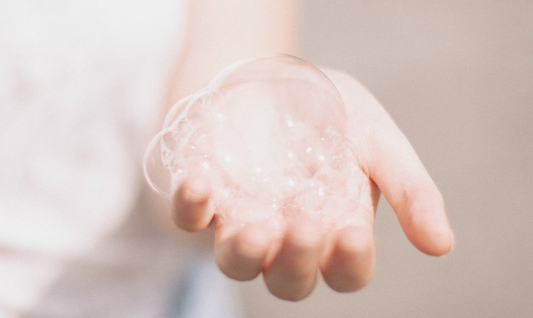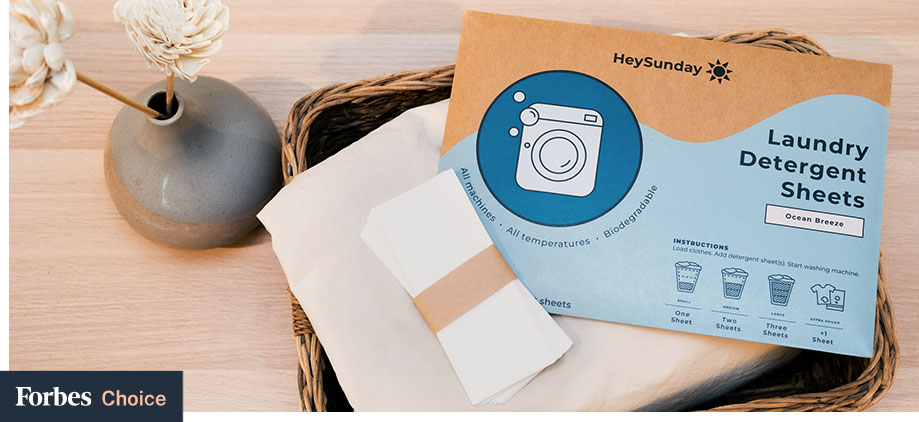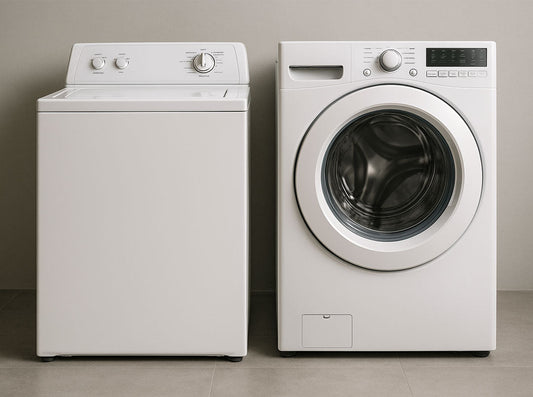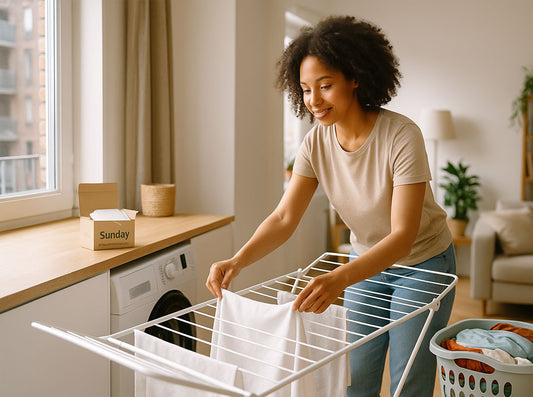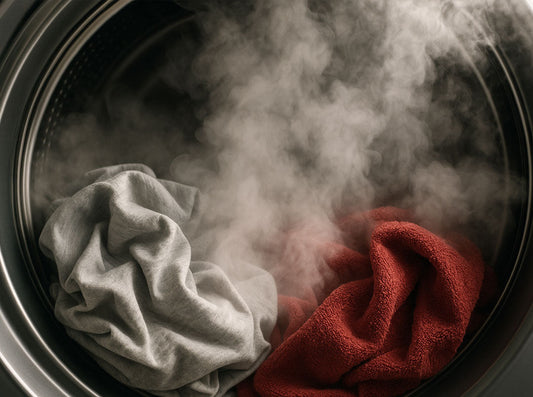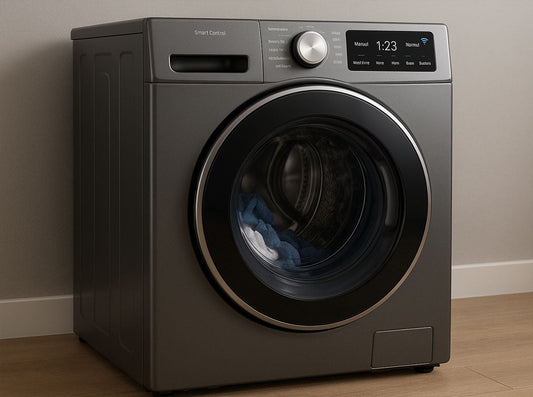DIY cleaning solutions might seem like a step toward cost-effective, sustainable living, but this approach may fall short when it comes to laundry care. In fact, homemade laundry detergent can ruin clothing, pose environmental and health risks, and even damage your washing machine, among other consequences.
Before you go this route, we encourage you to explore all the drawbacks of homemade laundry soap. We'll show you what to watch out for and, more importantly, offer viable alternatives like HeySunday laundry detergent sheets that match your eco-conscious efforts without compromising efficacy.
What Is Homemade Laundry Soap?
Like other DIY cleaning mixes, homemade laundry soap is a concoction of readily available household ingredients, such as bar soap, borax, baking soda, washing soda (sodium carbonate), or essential oils for fragrance.
You can find various DIY recipes for homemade laundry soap, but the process typically involves mixing grated soap with dry ingredients to make either a liquid or semi-solid soap. Regardless of the homemade laundry detergent recipe, the end result is a product used in place of traditional laundry detergents.
While this seems appealing, the challenge lies in sourcing and accurately measuring the ingredients to ensure they are safe and perform as well as commercial laundry detergents.
What Are the Risks of Using Homemade Laundry Soap?
In theory, you can make an effective DIY laundry detergent. However, most of us lack the right (and often expensive) equipment and ingredients to create a comparable alternative to traditional detergents. Since homemade soaps are untested and unregulated, you can't be sure they will perform to your standards, which poses the following possible risks:
Imprecise Formulation
All of the problems associated with homemade laundry soap arguably stem from imprecise measurements, improper ingredients, or a lack of special equipment. Making your own laundry detergent isn't the same as swirling a few components together, which is why commercial brands have purpose-built manufacturing facilities and third-party testing to ensure proper chemical composition, potency, safety, and consistency.
On the other hand, DIY laundry soaps lack the same precision and manufacturing standards, which can result in formulas that are either too harsh or too ineffective. For example, excess washing soda can make the solution overly alkaline. Conversely, not adding enough grated bar soap may result in a detergent that fails to remove dirt and stains.
Moreover, too much baking soda can leave a chalky residue on clothes, while too little can fail to eliminate odors. This lack of precision affects how your laundry feels and makes it harder to achieve consistent results, especially when dealing with different load types, sizes, and fabric sensitivities.
Potential Fabric Damage
One of the most significant risks of homemade laundry soap is its potential to damage fabrics, especially delicate types. Compared to commercially formulated detergents, homemade laundry soap often has unbalanced pH levels and lacks the proper chemical composition for most fabric types.
For instance, the alkaline nature of ingredients like borax and washing soda can be harsh on colored fabrics if not appropriately dosed, gradually breaking down the dyes and causing dullness over time. Additionally, certain types of soaps can leave behind a filmy residue, which affects the texture of clothes and can interfere with cleanliness.
Specific types of fabrics, such as wool and silk, are already vulnerable materials by themselves and require special care. Unless the homemade laundry soap is specifically made for delicate fabrics, it can cause irreversible damage, such as shrinking, felting, or texture alteration, and render these garments unusable.
However, these probably aren't the materials you want to run experiments on, so using a trusted laundry detergent brand is the safest method to care for them.
"Natural" Ingredients Aren't Always Safer
The idea that natural automatically equates to safe is a common misconception, particularly for homemade cleaning products. Not all "natural" ingredients are suitable for human health, and some chemical ingredients aren't actually dangerous in controlled doses. It all depends on the concentration and combination of the ingredients.
For example, borax has been subject to scrutiny in various medical studies due to its potential health hazards. It can disrupt the skin's natural barrier function, leading to dryness, irritation, and, in some cases, more severe dermatological reactions. Unsafe exposure or ingestion of borax can also cause reproductive issues and kidney failure. Still, borax is needed for its cleaning power and ability to lift stains.
Compromised Cleaning Efficacy
Unless you can access sophisticated ingredients like enzymes and surfactants, your homemade detergent probably won't work as well as a store-bought laundry detergent. Enzymes help target specific types of stains, such as proteins or starches, and break them down for easy removal. Likewise, surfactants lift dirt from fabrics and ensure clothes get thoroughly cleaned, which plays a substantial role in heavily soiled loads.
Homemade laundry soaps typically lack these crucial components, resulting in subpar fabric cleaning performance. Although ordinary bar soap usually has some surfactants and handles light cleaning tasks, it struggles with soiled laundry loads since it contains natural fats and oils, which detergents aren't supposed to have. Even worse, it can leave your clothes feeling dirtier than before since it's more of a soap than a detergent.
Additionally, it's challenging to accurately measure how much homemade laundry soap to use for each load. DIY laundry soaps aren't tested for efficacy like a commercial detergent, so you'll have to experiment with various doses to find the right balance (and account for differences in fabric types, colors vs. whites, and load size).
Questionable Environmental Impact
While DIY solutions are often perceived as more eco-friendly, it's not quite that clear for laundry detergents. Commercial detergents undergo rigorous testing to ensure they meet environmental safety standards, covering everything from the ingredients' biodegradability to their impact on aquatic life and ecosystems.
In contrast, the average consumer who makes homemade laundry soap probably doesn't understand the individual and combined ecological impact of the various ingredients included in the formula.
For instance, specific components like washing soda are toxic to aquatic organisms. If these components aren't adequately measured and formulated, they won't fully dissolve and can potentially contribute to water contamination. Plus, incorrectly dosing the right amount of soap can cause overuse, the need for additional rinsing, and water waste.
Insufficient Antibacterial Properties
Many commercial detergents include specific ingredients to kill bacteria and germs, ensuring a hygienic clean. However, homemade recipes often miss these crucial components. Typical DIY laundry soap ingredients like washing soda, baking soda, and bar soap might help remove some dirt and stains. Still, they don't necessarily possess the antimicrobial properties to eliminate all types of bacteria and germs from fabrics.
The absence of these antibacterial agents means that while clothes may appear and feel clean, they might not be sanitized entirely. This issue is especially important in households with young children, elderly adults, or individuals who need to stay as clean as possible, like nurses or doctors. Similarly, some laundry loads, such as kitchen towels or gym clothes, are prone to contamination and need proper sanitization to be used again.
Allergy Risks
We've already discussed how homemade laundry soap can cause skin irritation, but it might also pose allergy risks due to the unregulated mix of ingredients, particularly essential oils that can cause phytophotodermatitis, such as citrus oil. If residues of these oils remain on clothing and come into contact with the skin, they can cause allergic contact dermatitis (ACD), a delayed hypersensitivity reaction.
Lavender oil is also known to cause contact dermatitis in some people. This allergic reaction can manifest as itching, redness, or similar symptoms of skin irritation. While essential oils add pleasant aromas, they're not always the best components for people with sensitive allergies.
Because of the lack of standardization and testing in homemade soap recipes, the concentration of allergens can vary significantly, making it difficult to predict the likelihood and severity of allergic reactions.
Inconsistent Reactions with Different Water Types
Commercial brands design laundry detergents to work effectively for all water types, whereas homemade solutions aren't quite as adaptable. In areas with hard water, which contain high levels of minerals like calcium and magnesium, DIY laundry soaps can produce soap scum and leave behind an oily texture.
In contrast, homemade laundry soap might perform differently in soft water, potentially leading to over-sudsing. This can result in rinsing issues because soap remains in the fabric, causing skin irritation for sensitive individuals and failing to clean the laundry properly. Similarly, homemade soap might not perform as well in varying water temperatures, which can pose a problem when you need to run a cold cycle for delicates.
Potential Washing Machine Damage
Homemade laundry soap might damage modern washing machines if it causes too much residue build-up. This is especially problematic in high-efficiency (HE) models, which use less water and require detergents that can rinse out more easily. Homemade soaps lack the same dissolving properties and tend to leave behind residue, which can gradually accumulate in various parts of the machine.
This build-up can clog the washing machine's internal systems, such as the drain pipes and filters. Over time, these clogs can reduce efficiency and lead to complete blockages, necessitating costly repairs, maintenance, and even replacement in severe cases.
Additionally, the residue can create an environment that encourages mold and mildew growth, especially in the damp, enclosed spaces of a washing machine.
What’s a Sustainable Alternative to Homemade Laundry Soap?
We've covered several explanations for why homemade laundry soap is bad, but what's the next best alternative? Various eco-friendly options surpass homemade soap, including soap nuts, concentrates, and detergent sheets. Among these, HeySunday's laundry detergent sheets stand out as a superior choice, balancing eco-friendliness with convenience and cleaning power.
We designed these sheets with sustainability and simplicity in mind, crafting them with biodegradable materials and no-waste packaging to ensure nothing harmful gets left behind. Free from harsh chemicals, HeySunday’s plant-based detergent sheets are gentle yet effective, even for those with sensitive skin.
Our detergent sheets are pre-measured to eliminate the guesswork and waste associated with liquid and powder detergents. They're also lightweight by design and take up minimal space, eliminating excess plastic and waste. The sheets dissolve effortlessly in water with no residue, which makes them suitable for all types of washing machines, water temperatures, and fabrics.
In short, you get the cleaning power of traditional laundry detergents combined with the convenient, sustainable appeal of DIY soap. And with a HeySunday laundry detergent subscription, you never have to worry about running out.
Final Thoughts
Whenever you deal with cleaning agents, chemicals, or unfamiliar substances, it's essential to exercise caution and ensure you know how to handle them. While DIY laundry soaps seem like a good idea, they pose various risks and likely won't be as effective as commercially made detergents.
However, HeySunday's non-toxic laundry detergent sheets are an ideal option if you want a convenient, effective, and gentle alternative. By choosing these sheets, you can ensure the safety and longevity of your fabrics, save time and money, and take a pivotal step to living a more eco-conscious life.
Frequently Asked Questions
Still have questions about homemade laundry soap? Here are some common inquiries and our expert answers:
What is the problem with homemade laundry detergent?
Homemade laundry detergents typically lack the cleaning power of commercial brands. They can damage fabric or washing machines, leave residue behind, and may not be safe for your health or the environment due to the potential allergens and unregulated ingredient blends.
Does borax damage washing machines?
Borax, used in moderation, generally doesn't damage washing machines. However, overuse can lead to residue build-up and potential mechanical issues. It's crucial to measure out the appropriate quantities, especially in high-efficiency (HE) machines, to prevent any long-term damage.
Is homemade laundry soap HE machine-safe?
Homemade laundry soap can be HE machine-safe if formulated to produce low suds that meet the machine's requirements. However, homemade laundry soap that causes too many suds can cause issues, residue build-up, or insufficient cleaning, which affects the machine's longevity and efficiency.
Is it cheaper to make homemade laundry detergent?
In some cases, it's certainly cheaper to make homemade laundry detergent than buy it in a store. However, the high likelihood of it causing damage to your clothes or washing machine outweighs the upfront costs (and time investment), so it's better to use a trusted brand over making it yourself.
